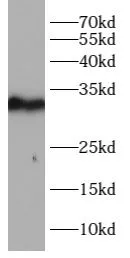PLIN2 antibody - 100 µg
Host : Mouse
Clonality: Monoclonal
Clone: 1G4
Isotype: IgG1
Immunogen: adipose differentiation-related protein
Purity: ≥95% as determined by SDS-PAGE
Form: Liquid
Molecular weight: 50 kDa
Uniprot: Q99541
Gene id: 123
Background: ADRP(adipocyte differentiation related protein) also known as ADFP, adipophilin, or perilipin-2, is a member of PAT family which is responsible for the transportation of lipids and the formation of lipid droplets. ADRP is localized on the surface of lipid droplets in a variety of tissues and cell lines. ADRP is not detected in undifferentiated cells but increases rapidly to high levels when adipocyte precursors differentiate into adipocytes. Anti-ADRP antibody is a reliable and sensitive marker for lipid droplet. Enhanced expression of ADRP is linked to diseases with abnormal lipid storage, including hepatic steatosis, atherosclerosis and diabetes. Immunohistochemistry of ADRP may facilitate histomorphological diagnosis of these diseases.
Field of research: Cancer, Cardiovascular, Metabolism
Storage conditions: PBS with 0.02% sodium azide and 50% glycerol pH 7.3, -20°C for 12 months(Avoid repeated freeze
thaw cycles.)
Applications: ELISA, WB, IHC
Dilution: WB: 1:500-1:2000; IHC: 1:50-1:500
Target: PLIN2
Purification: Protein A+G purification
Reactivity: Human

Clonality: Monoclonal
Clone: 1G4
Isotype: IgG1
Immunogen: adipose differentiation-related protein
Purity: ≥95% as determined by SDS-PAGE
Form: Liquid
Molecular weight: 50 kDa
Uniprot: Q99541
Gene id: 123
Background: ADRP(adipocyte differentiation related protein) also known as ADFP, adipophilin, or perilipin-2, is a member of PAT family which is responsible for the transportation of lipids and the formation of lipid droplets. ADRP is localized on the surface of lipid droplets in a variety of tissues and cell lines. ADRP is not detected in undifferentiated cells but increases rapidly to high levels when adipocyte precursors differentiate into adipocytes. Anti-ADRP antibody is a reliable and sensitive marker for lipid droplet. Enhanced expression of ADRP is linked to diseases with abnormal lipid storage, including hepatic steatosis, atherosclerosis and diabetes. Immunohistochemistry of ADRP may facilitate histomorphological diagnosis of these diseases.
Field of research: Cancer, Cardiovascular, Metabolism
Storage conditions: PBS with 0.02% sodium azide and 50% glycerol pH 7.3, -20°C for 12 months(Avoid repeated freeze
thaw cycles.)
Applications: ELISA, WB, IHC
Dilution: WB: 1:500-1:2000; IHC: 1:50-1:500
Target: PLIN2
Purification: Protein A+G purification
Reactivity: Human

